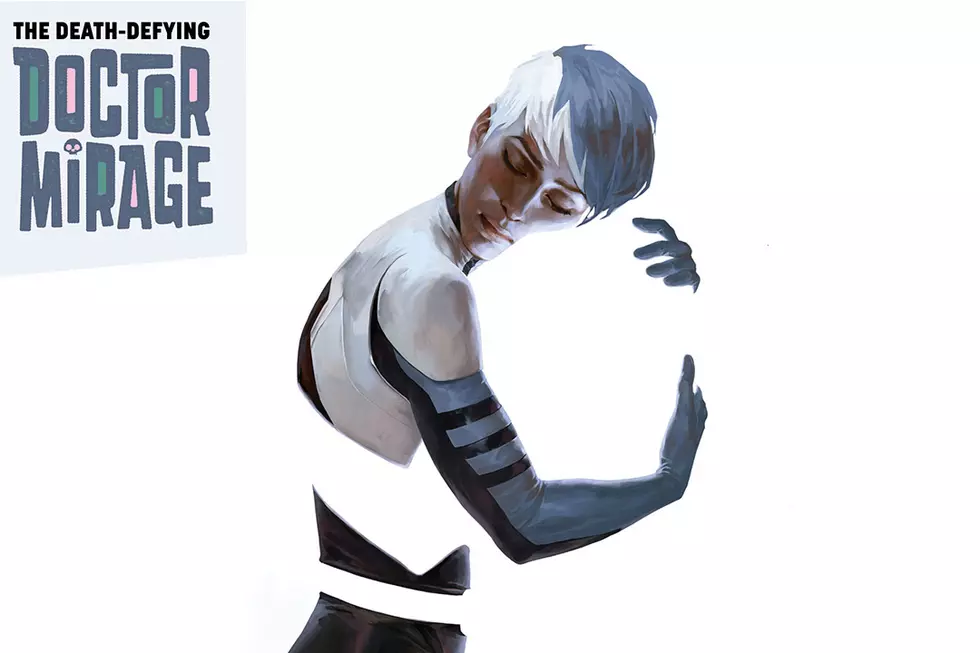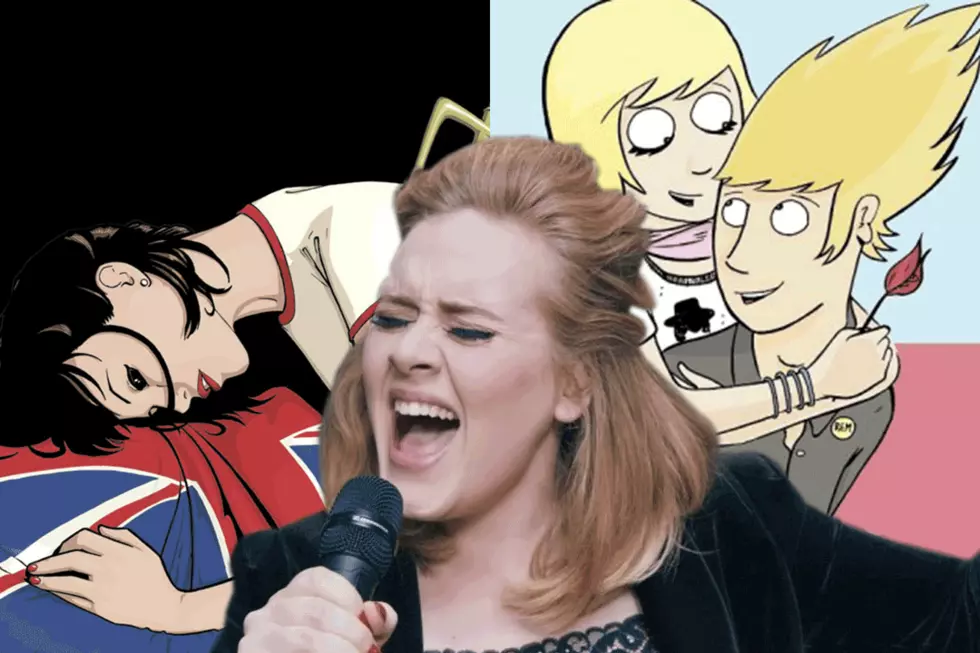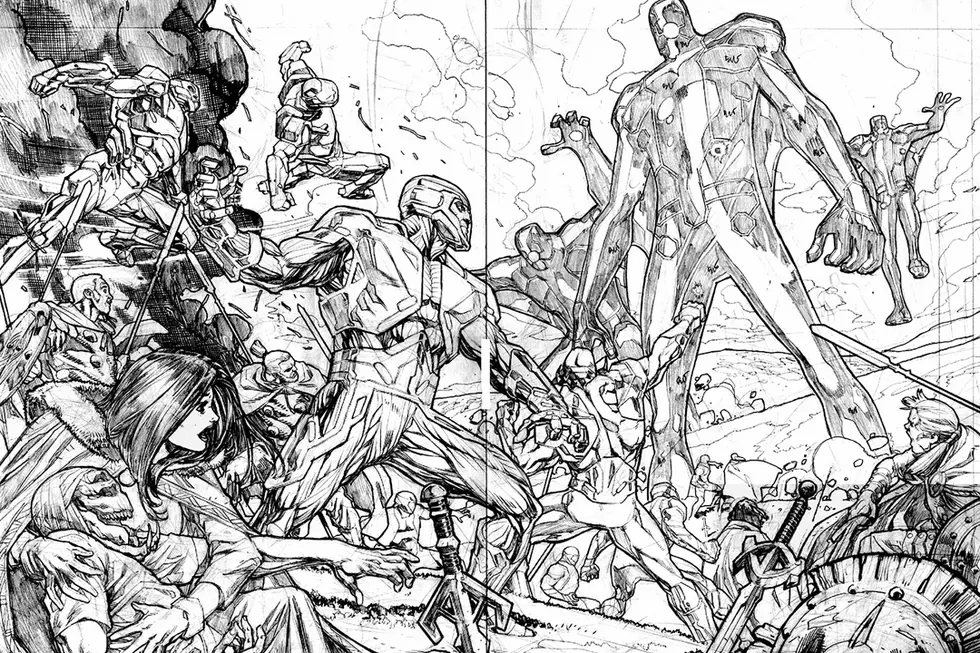
Mixing Paranormal and Practical: Jen Van Meter Talks ‘The Death-Defying Dr. Mirage: Second Lives’
Valiant's Dr. Mirage is returning with a new miniseries next month, and in the yearsince the end of the last miniseries focusing on paranormal expert and ghost-talker Shan Fong, a whole lot seems to have changed. For one thing, her deceased husband has returned to the land of the living — or at least, his spirit has.
That alone changes a lot of the dynamics of her life, and it shows in the new series, The Death Defying Dr. Mirage: Second Lives. Some things haven't changed, though. Namely, the creative team of writer Jen Van Meter and artist Roberto De La Torre. In advance of the first issue's December 23 release, we spoke with Van Meter about finding Shan in a very different place in her life, the book's relationship themes, ghost research, the new series' tone shift, and much more.
ComicsAlliance: We’re finding Dr. Mirage in a very different place than where she was in the first series. It feels like there are some things that have happened between the two series. Can you talk a little bit about where we find her?
Jen Van Meter: The first series really begins with her bereft of everything that matters to her and trying to figure out how to get it back. What I wanted for this second series was to be able to say, okay, now she’s got what she wanted, except not quite. That’s a very different story because when we have lost everything, we don’t really feel guilty or ashamed of wanting to get it back, but when we’ve got almost everything we wanted, it’s really easy to be down on yourself for wanting just that little bit more.
That’s a different headspace to put somebody in, but also — and there’s no spoiler in saying that the first series is about going to get her dead husband and getting him — what I wanted to begin this new series was to say, they’re together and everything’s awesome. It’s like a fun rom-com, except wait a second, it isn’t because their relationship is there, but it’s without physicality. Hwen can’t do magic. He can’t physically manipulate anything. They can’t be together romantically.
I just really wanted to explore that space in a relationship where you’re like, well, we should be happy because we’re back together, but we’re not quite happy enough. We want to fix that. Of course, that’s going to open up a whole can of worms — inadvertently — that they’re going to have to address.
Hopefully, by the end of the miniseries, I can say something about the extent to which they can reconcile the space that they’re in.
I also just really like the daily life stuff. You were talking about the stuff that happened in between. Mostly I just wanted to set up a sense of them having begun trying to rebuild their lives together, and to shorthand rebuilding the house as an element of that.
CA: In addition to rebuilding the house, there’s the aspect of the way that her business has changed because now he’s involved with it. We see that in the opening sequence that involves them getting called into a wedding that sort of goes off the rails. It’s a way to see Dr. Mirage operating not just as a solo act.
JVM: I had toyed at some point with whether or not she would feel sort of robbed of identity, because now she’s not the only person on her team who can talk to ghosts. At the same time, that started to seem much less important to me as a story issue or a character issue because I think being able to be connected to him and to this whole ghost world that they both engaged, that’s going to be what really gets them through a lot of the stuff they’re dealing with now.
I had so much fun writing the ghost wedding. When I was writing the first series, I got really into listening to podcasts and spooky paranormal radio show stuff that I find live streaming. Some of it’s so goofy and bizarre, but one day I was listening to this thing. This guy was calling into Coast to Coast A.M. or Art Bell or one of those things to say, “I’ve got this business, and it’s haunted.” They were like, “Oh, so you want us to tell you how to get the ghosts out?” He said, “No, I need to know how to arrange for liability insurance so I can host haunted events.” And they were like, “Well, the insurance companies aren’t really going to buy into that.
It was this really interesting moment of watching hardcore paranormal belief totally clash with practical reality. It stuck in my head that somebody, somewhere in the world of this book is sitting there saying, “Well this guy is hosting haunted weddings. Something is clearly happening there. Do we have to have liability insurance for that? How do we do that?” It cracked me up so much that I thought I’ve got to do something with that.
CA: I’m sure there’s not a huge subsection of business owners that have to think about that, but there are certainly some.
JVM: [Laughs] It’s so funny. When you go to certain communities, like the Salem witch walking tours, or Portland has one; “Go see haunted Portland!” I am for the most part not somebody who has a lot of buy-in on that kind of thing, but I’m writing a book where that’s an absolute fact. If Dr. Mirage was visiting Portland, and was told, “Come on the walking tour,” she’d be like, “Are you people insane? You have no idea what could happen here!” I love the idea of her just thinking that people are being ridiculously cavalier about that sort of thing, because for her it would all be absolutely legit.
CA: It’s like indemnifying yourself against lawsuits.
JVM: Exactly. Someday in this book — I’m sure [Valiant CEO and chief creative officer] Dinesh [Shamdasani], [executive editor] Warren [Simons] and [director of marketing] Hunter [Gorinson] are all very excited about me doing something about the lawsuit, where she has to testify as an expert witness.
CA: Oh, I feel like ghost law is a genre that has yet to be tapped fully.
JVM: Exactly! We need a whole courtroom story. [Imitates Law & Order “dun-dun” sound]
CA: I’m into it. I’m sold. You were talking about not necessarily fully subscribing to the paranormal stuff, and I kind of fall into the same category, but I love stories about that kind of stuff.
JVM: Oh, so do I.
CA: I kind of have a fascination with that whole world. My wife is really into watching the reality ghost TV shows on the Travel Channel and that kind of thing. Is that sort of your research material, along with the podcasts and radio shows? I know you delve into some more ancient stuff, too. There’s a plot point in this first issue about an ancient scroll. Is it a mix of historical research and what you might call the conspiracy stuff?
JVM: It’s kind of pulled in from all over the place. For this book, I have not felt a need to adhere to a lot of connection to what you might call real-world magic, say Wicca or practical magic as adherents pursue in in our real world. I respect it and it’s there, but I’ve actually kind of avoided doing too much in these books with wanting to rub up close to what’s real for a lot of people in a way that would be disrespectful or dismissive.
But I’m very interested. I love reading about ancient magic practices, ancient magic belief, and kind of going, maybe it’s not my reality, but if it were, it would definitely be part of Shan’s reality.
For instance, one of the seeds — a lot of it wound up getting discarded in revision when I was building this and talking with [editor] Alejandro [Arbona] about how to go, but in a very early stage, I was reading a ton of stuff about the Egyptian concept of the soul. I started from a place where I had this very rudimentary understanding of how the ancient Egyptians conceived of the afterlife.
The more I read, the more I discovered you have nine souls, or nine aspects of your soul. And there was this whole thing that I encountered about, essentially, curses that would keep you alive, but unable to go have your proper afterlife. There are charms in the tombs, where they have the furniture and the cats and the servants and all the things that are going to go with you. There are protective wards to keep your enemies from cursing the aspect of your soul that’s going to make the trip so it stays and all your stuff leaves without you.
There are layers and layers or complexity to it that I didn’t understand. The more I learned about it the more I thought, oh my gosh, in Shan and Hwen’s world. if this is a legit way of understanding that process, then there’s such a thing as murdering a ghost. Making it deader than dead. That was fascinating to me because then, all of a sudden, what it would mean for her. There would be a serial killer on the loose that only she could catch.
CA: I want to dig into that a little bit. This story has a different feel from the previous miniseries in that it feels more like a straight-on adventure story or a mystery story—
JVM: Yeah. It’s a little more Nick and Nora.
CA: There’s a lightness to it. The first miniseries got very heavy and was a lot about grief. Shan was in a dark place in that miniseries. The feel of this one has a lightness that is really easy to latch onto. That’s not a value judgment against the first series, but did you approach this one wanting to have an altogether different tone?
JVM: Yes, absolutely. The minute I met Shan in the pages of Shadowman, and Alejandro said, “Hey, would you want to do this?” one of the first things in my head was that I really like this character. I also really love the original Valiant series with Hwen and Carmen running around having crazy Hart to Hart, nutty adventures. I wanted to be able to tell a story that got her to a place where she could have some of that, so the first story was in large part, I suppose a kind of second origin of them. It’s her story, but it’s also their story. I wanted to get to a place where it could be about them. Once it’s about them, it could be fun again.
I really wanted the first one to have some intensity to it. I really like how it came out. I’m really pleased with the response that people seem to have to it, but I wasn’t done with the script for issue #2 before Alejandro and I were talking about how in the next one, we want them to be together and have a little more snap in their lives, for them to have the relationship they deserve. Part of the intensity of the first story was to say, these people really do belong together. They should get it, so when they did it would get to feel like an earned lightness.
It’s fun to get to write them a little lighter. It’s a tricky one to do, though, because the stakes are kind of intense for them. I want to keep it light without having them be too cavalier about the jeopardy that other characters are in, or the dangers to themselves. That sort of, “Goodness, what have we done?” moment. We’ll bring a little bit of intensity back, I think.
CA: Though it is a lighter tone, there are still are some underlying themes that really resonate the way that the theme of grief resonated in the first series. So much of this story is about — and you spoke to this — relationships and how sometimes there’s this sense that, if we just had this one thing, everything would be better. There’s a constant striving. There’s this tension in Shan and Hwen trying to accomplish that thing to make their lives perfect.
I don’t know of that many people who are married to ghosts, but I do think there’s a very real feeling in what they’re trying to do. Did that come from a real place for you?
JVM: I think that’s a really normal human thing. I think we do it as individuals as well is in our relationships where we say, you know, “if only we owned our house,” or “if only we had a better job.” We tend to one-more-thing ourselves as a way of poking ourselves in the butt, sometimes. Sometimes it’s totally legit. If this one thing in my life was a little bit better, then I wouldn’t be struggling with money, or I wouldn’t be struggling with health issues or whatever.
In terms of relationships, I think for me, personally, my experience is that when anything else is going wrong in my life, it’s the strength of my relationships that tends to get me through. In my marriage, certainly, the stability of that tends to be the thing I lean on even when it feels like everything else is coming unglued. If there were a misfortune that put distance in my marriage, it would be a lot harder to handle anything else that was coming at me.
One of the things that came up very early when I was developing this, before there was a script even, the very initial core concept was that Hwen is back, but because they cannot touch, there is this distance. That’s the thing they’re going to want to address. They’re going to see if they can find some sort of material form for him, enough materiality that they can kiss, that he can do magic, that sort of thing. I was on the phone with Alejandro talking about it and sort of blathering on in a couple different directions. Alejandro got really quiet and said, “You know, Jen, it sounds like you’re talking about a couple dealing with somebody having to be a caretaker to somebody whose health is failing.”
I stopped and realized that the whole time I’ve been developing this story, our local PBS had been doing a series of interviews with families of returning vets coming back with injuries. They’ve been doing profiles on how families were dealing with all the things that come up when that happens. I hadn’t been thinking about it consciously for this story, but clearly there had been a connection. The minute Alejandro said it I was like, “Oh, sh--, yeah, that’s exactly what I’m thinking about.”
I don’t want to make it as heavy-handed as saying this story is a metaphor for that, because I don’t think I’m the person to do that. But I certainly think that the depth of longing that happens when you’re like, “Oh baby, I’m so glad to have you back alive, and now we have to deal with the fact that you’ve been hurt. You’re suffering. There are residual effects for us both.”
That has lurked underneath the development of this story for me, in a real way. It is something I have an enormous amount of empathy for, so if I can try to be honest to that in my head while I’m telling their story, which is not that story.
CA: It almost feels like you’re telling the story of a relationship in reverse. We started with grief over the death of a spouse, now she's taking care of a partner—
JVM: Of somebody who’s effectively injured.
CA: I assume that in the fourth of fifth miniseries we’ll be dealing with teen relationship problems.
JVM: What time we meet. [laughs]
CA: Trying to make curfew.
[Both laugh]
JVM: It’s funny that you should say it that way. I hadn’t thought of it, but they are going backwards, which is very like them.
CA: Before we wrap, I want to talk a little about the art in the series. I can tell you’re really excited about it. There’s a sort of grittiness to it this time around. When you were writing it, did you have a clearer idea of what it would look like than with the first series, and did you tailor your scripts to that?
JVM: The first series is five issues of me learning how Roberto does what he does. The first couple scripts was me just getting to know him. With this series, I feel like when I sat down and said, oh, I want a scene where this happens or that happens, I had a much better sense of anticipating how that would look when Roberto does it, or what he might want to do.
He’s got such an evocative scritchiness and I think that the moodiness of what he does is so gorgeous. The thing that is most exciting to me about this series is that I knew I was going to be writing whole pages where Shan is smiling, and meeting happy people and laughing. I thought, I haven’t asked him to do this before. I don’t know what it looks like when everybody’s laughing. It’s become kind of a fun, delightful thing for me to see what he does when the mood is lighter, because it’s still his hand, and that scritchiness and that moodiness and the shadows. I think somebody who is joyful in that context looks even more so. There’s some nice contrast there.
If you’ve seen the first issue, you’ve met Selene and her family, and you’ve seen Barcelona. It was so much fun to say to him, “Go to town! Draw magic Barcelona.” I think you can see him having fun. When Dave Baron
comes in and colors everything, the contrasts and the brightnesses that he brings to it, I think is just stunning.
CA: I think you can tell the genre shift through the art. The first series had a shadowiness and moodiness that made it very horror-like in some ways. This one has more of a murder-mystery look about it.
JVM: I’m so aware of Roberto and his style that I feel like there’s a nice, smooth connection between the way this looks and the way the first story looks, but you can certainly see him making different choices because it’s a lighter story and a lighter world. And also, because I think I’m figured out between the first and second series a little more about how to play to the things he likes to do. I don’t think the first series was this harmonious. I think we worked really well together and made something that was strong in what it was. I think with this one, I may be writing better scripts for him. [laughs]
I think the happy couple theme is allowing him to do some lighter stuff and some more actiony stuff. I think we’re having fun, and I think it shows. That’s what matters. And he and Dave work so beautifully together. They’re the happy couple of the book, really.
More From ComicsAlliance

![‘X-O Manowar’ Comes To A Thundering End With A 64-Page Final Issue [Preview]](http://townsquare.media/site/622/files/2016/09/XO00.jpg?w=980&q=75)
![‘X-O Manowar’ #50 Features Art by Colleen Doran and Many More [Preview]](http://townsquare.media/site/622/files/2016/07/XO_050_FEATURED.jpg?w=980&q=75)


![Take A Very Stressful Vacation To Bloodshot Island In ‘Bloodshot Reborn’ #14 [Preview]](http://townsquare.media/site/622/files/2016/04/Bloodshot00.jpg?w=980&q=75)


![‘Doctor Mirage: Second Lives’ #2: Ghosts, Sex Cults, and Gorgeous Covers [Preview]](http://townsquare.media/site/622/files/2016/01/spectre_featured.png?w=980&q=75)
